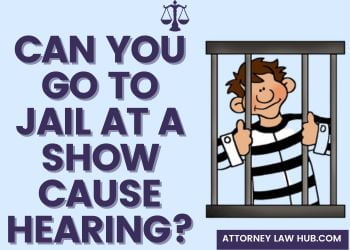Yes, it is possible to go to jail as a consequence of a show cause hearing; but You often cannot be arrested right away after a show caused by a hearing. This kind of hearing is more about defending or justifying your behavior to a judge or authority figure.
It’s necessary to understand that this is not a criminal trial where a person will be jailed. Instead, a court trial is held to see whether there is sufficient justification to proceed with other measures like filing charges or imposing sanctions.
As a result, it’s critical to be honest and prepared for a show cause hearing, but the goal is not to get arrested immediately.
Breaking Down the Facts: Can You Go to Jail at a Show Cause Hearing?
An individual is asked to defend or explain their behavior in front of a court or other authority at a show-cause hearing. The goal is to assess if certain actions or decisions have justifiable justifications, rather than instantly throwing someone in jail. Here is an outline:

The hearing’s nature:
Administrative or civil cases sometimes involve show-cause hearings. They can happen in a variety of settings, including regulatory organizations, immigration courts, and family courts. These proceedings are hearings, not criminal trials.
Explanation and justification:
During a show cause hearing, you will be required to give a thorough justification for your judgments, actions, or failure to follow particular rules or orders. You must always respond in an open, sincere manner.
Potential Results:
A show-cause hearing’s results might take many different forms. The following outcomes are potential, depending on the situation and the judge’s or authority’s decision:
The action is over:
If your justification is accepted, the case can be dismissed without further consequences.
Warnings or fines:
As a result of your acts, the judge or authority may give warnings or apply fines.
Future legal actions:
A show cause hearing may occasionally result in more formal legal actions, like a trial or a hearing with more significant results.
Legal Counsel:
You have the right to counsel during a show cause hearing, and it is frequently beneficial to speak with a lawyer who can guide you through the procedure and defend your rights.
As a result, a show cause hearing is a legal procedure in which you are required to defend your acts; it is not an instant jail sentence hearing.
It’s a process for settling disputes or issues, and the result is determined by the particulars of your case and the ruling of the court or other authority concerned.
What is a show cause hearing?
A show cause hearing is a court procedure when an accused is asked to defend themselves against potential punishment or penalty. It’s similar to a formal hearing in court or a legal setting where a person must present justifications or supporting documentation for any action or judgment that might be taken against them.

For example, the judge in a court case might set up a show cause hearing if someone disobeys a court order or breaks a regulation. The individual must defend their actions during this hearing in order to avoid being found in disobedience by the court, which carries a penalty of fines or perhaps jail time.
A show cause hearing is essentially an opportunity for someone to explain their behavior and prevent unfavorable outcomes. People can tell their side of the story and possibly avoid punishment during this key stage of the legal process.
What can happen at a show cause hearing?
A show cause hearing is an important phase in the judicial process since a number of things might occur there. What you need to know is as follows:
Explanations:
The offender has the opportunity to defend their choices or actions in front of a judge or other authority figure. This is a chance to explain any misunderstandings or give explanations for their actions.
Defence:
They can offer arguments as to why they should not be subjected to potential consequences or fines. They have the opportunity to make their case now.
Resolution:
The result can change depending on the circumstances. If the justification is convincing, the person may be free from punishment or have it lessened. On the other hand, if their justifications don’t hold up, they can suffer the implications.
Impacts:
A judge or other authority may impose penalties such as probation, fines, jail time, or other restrictions. Depending on the particular circumstance, these effects can range in severity.
Legal procedure:
Based on the evidence presented, the show cause hearing can also determine whether the legal procedure will continue in its current form or if it will be modified or adjusted.
In summary, a show cause hearing is an important stage where people have the chance to defend themselves, maybe avoid serious penalties, and shape the course of their legal difficulties. It plays an essential role in ensuring fairness and accountability in the legal system.
How to win a show cause hearing?
The procedure for winning a show-cause hearing can be difficult. It depends on careful planning, a solid understanding of the circumstances, and respect for the legal process. Let’s discuss the essential actions you must take to complete this process properly now:

Recognize the Problem:
First, be sure you understand the purpose of the hearing. What instruction or law are you accused of having broken? Understanding the details is essential.
Gather Evidence:
Collect all necessary records, documents, and other supporting documentation for your claim. Emails, receipts, or witness statements are a few examples of this. Your closest confidant may be solid proof.
Seek Legal Advice:
If the situation is complicated, think about speaking with an attorney. They can help you navigate the process, ensure you have a sound plan, and understand your rights.
Create Your Justification:
Prepare a defense for why you shouldn’t suffer the consequences. In your arguments, be simple and clear. Rely on the truth and the facts.
Respect Court Etiquette:
If the hearing is in a courtroom, respect the rules of politeness. Consider your attire and how you address the judge. Keep your composure and act with courtesy.
Present Your Case:
During the hearing, logically and with the help of the evidence you’ve acquired, tell your side of the tale. When speaking to the other party and the judge, show deference.
Observe Your Hearing:
Pay attention to what the opposing side has to say. Understanding their perspective will enable you to successfully counter any arguments they may have.
Follow Instructions:
Make sure to follow any orders or guidelines given by the court or other authority throughout the hearing. Possessing a cooperative attitude can be advantageous to you.
Remain Calm:
During a show cause of hearing, emotions might run high, but it’s important to keep control of yourself. Your case may suffer if you lose your temper.
Be patient:
The decision might not come quickly. Await the judge’s or other authority’s decision. Be ready to accept a choice once it has been made, whether it is favorable to you or not.
What happens at an order to show cause hearing?
One of the primary things that happens at a “Order to Show Cause” hearing is that a person is expected to justify whether they carried out or did not carry out a requirement as outlined in a court order or legal agreement. They must present their side of the story, just as in a courtroom hearing.
For instance, the other party may ask for this hearing if someone hasn’t paid child support as agreed upon. The person required to pay child support must explain their reasons for missing payments during this time. They must provide a convincing justification, such as a change in circumstances or a financial difficulty.
These hearings offer an opportunity to talk about the problem and come up with a solution. The judge will hear arguments from both sides before deciding if there should be any penalties, such as fines or modifications to the court order. It’s necessary because it offers people a chance to defend themselves if needed and ensures that they abide by court decisions and agreements.
Conclusion
To sum up, a show cause hearing is a court procedure when people are asked to defend their deeds or choices in front of a judge or other authority figure. It is not a quick trip to jail but rather a chance to defend oneself, offer explanations, and perhaps escape fines or penalties.
These hearings are essential for resolving conflicts and guaranteeing justice in the legal system. Understanding the matter, gathering evidence, seeking legal counsel if necessary, presenting a convincing defense, and remaining composed and respectful during the proceedings are all essential for success in a show cause hearing.
These hearings are an essential component of the judicial system because they give participants the chance to explain their acts and prevent rapid negative outcomes.



